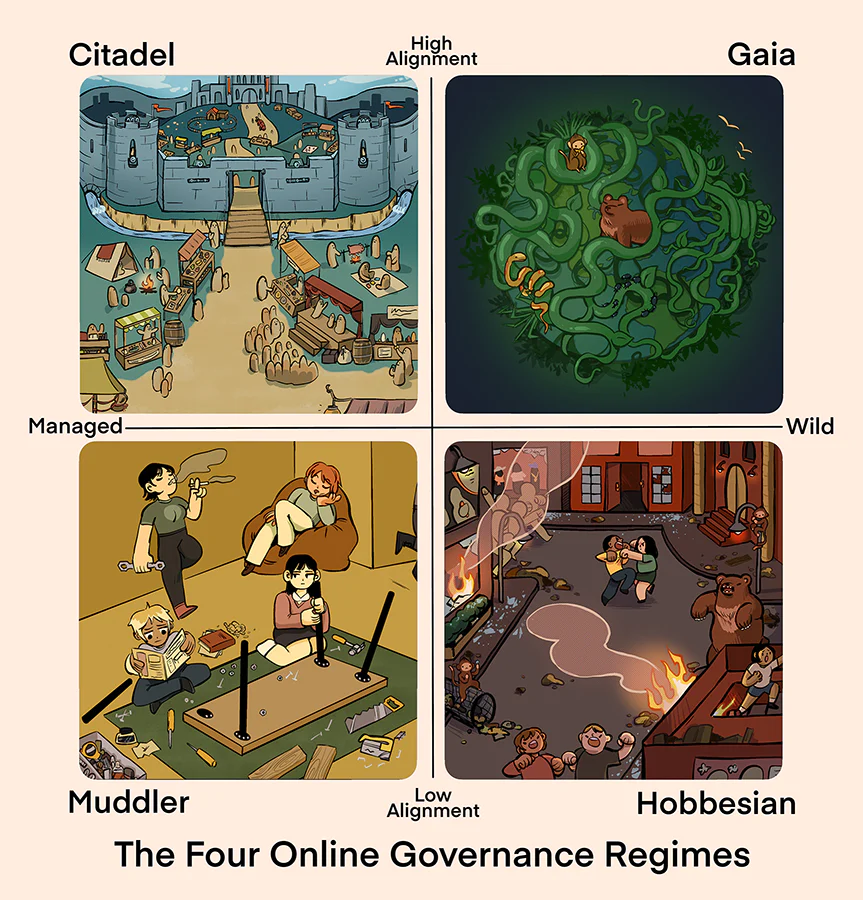Related: Moderation
Community Governance
Homeostasis of communities
- Important to have a healthy mix of internal and external influence
- How do the people within the community conform to the community? Or to external labels of people in the community
- Secluded vs public: digital commons
Preserving the sanctity of natural interactions
- Not monetizing human interaction
- Screen for value alignment
- Interviews (two-way vibe check)
- Publishing list of values
- Resonance with a large body of writing
The Art of Online Governance
Source: The Yak Online Governance Primer

See also: Bartle Taxonomy of Player Types
Four Online Governance Regimes:
- Hobbesian: Governance ideas responding to wild defaults and low alignment that attempt to foster progress despite conflict and chaos
- Generally ok for early years of a subculture or a social network but fails when it scales or becomes popular (e.g. external influence is too strong)
- Gaia: Governance ideas responding to wild defaults and high alignment that attempt to foster progress using the patterns and harmonies of nature
- as a warning, see The Tyranny of Structurelessness by Jo Freeman
- Muddler: Governance ideas responding to structured management with low alignment; commonly known as “herding cats,” attempts to foster progress by structuring local activities
- Citadel: Governance ideas that assume a consciously architected and structured context, usually with top-down alignment forces
Traps
- Techno Utopia trap
- an attempt ‘to build it better’ from tabula rasa (very ‘move fast and break things’)
- “While this blend of tabula rasa thinking and romantic cherrypicking of reference points can occasionally lead to refreshing new insights and much-needed shedding of historical baggage, it can also lead to naive idealism and utopian, wishful thinking, and governance attempts that fail through inevitable disillusionment.”
- Grand Old Institution trap
- opposite of the Techno Utopia trap
- those involved with long-standing research/scholarship in governance and management (e.g. from academia) often approach the question as though the context of new digital tools, information ubiquity, and unusual organizing aims changes almost nothing
Turing-Complete Governance
Source: Turing-Complete Governance by Saffron Huang
- “Auctioning off or loaning away voting power to those uninvested in quality governance, or want to steer governance towards selfish ends misaligned with the community, is generally a terrible idea.” (see: Plato’s Ship of State)
- Skeptical about normalizing airdrops as reward for early investors
- “Imagine if we had airdrops for more decisions relevant to the off-chain world, like participating in local council”
- Wouldn’t this just lead to optimizing for airdrops? This happened with ENS (Goodhart’s Law)
- “Turing-Complete governance shouldn’t be advocated as a way to make the most complex algorithm possible. The point is that we can have any inputs we want, and any computational transformation of those inputs to produce some output. Vitalik has pointed out that simple social systems with more predictable outcomes and understandable processes for tweaking the outcome are more desirable” (see: Gall’s law)
- “Imagine if every application on the Internet by default had a zero-downtime, publicly exposed API”